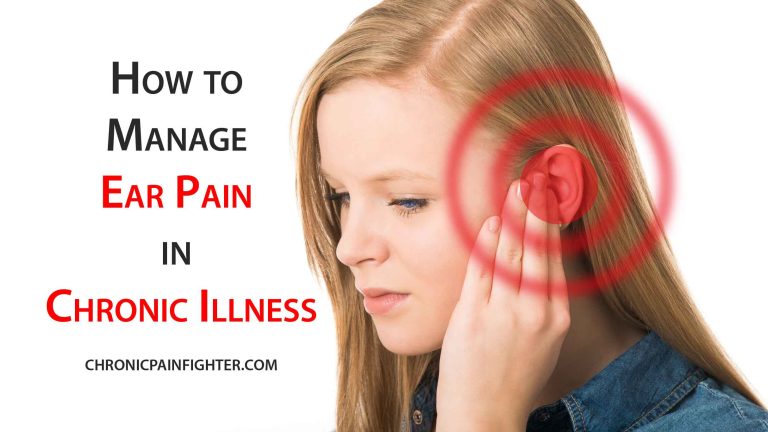Chronic illness can bring a host of unwelcome symptoms, including ear pain. This persistent discomfort can significantly impact quality of life, making it challenging to focus, sleep, and engage in daily activities. While managing ear pain requires addressing the underlying cause, there are numerous strategies you can employ to alleviate the discomfort and improve your overall well-being. This guide will provide you with practical tips and techniques to effectively manage ear pain in the context of chronic illness.
Understanding the Causes of Ear Pain in Chronic Illness
Ear pain, also known as otalgia, can be a symptom of various chronic illnesses. It’s essential to consult with your healthcare provider to determine the root cause of your discomfort. Some common causes include:
- Infections: Chronic ear infections, especially otitis media (middle ear infection), can cause persistent pain.
- Autoimmune Disorders: Conditions like rheumatoid arthritis and lupus can affect the joints and tissues in the ear, leading to pain.
- Temporomandibular Joint Disorder (TMJ): This condition can cause pain in the jaw, head, and ears.
- Neuralgia: Nerve pain in the trigeminal nerve, which passes through the ear, can trigger ear pain.
- Migraines: Severe headaches associated with migraines can often cause pain that radiates to the ears.
- Sinusitis: Inflammation of the sinuses can lead to pressure and pain in the ears, as the sinuses are connected to the ears.
Seeking Medical Evaluation: The First Step to Relief
Before exploring home remedies or self-care strategies, it’s crucial to seek medical evaluation. A doctor can help identify the underlying cause of your ear pain and recommend appropriate treatment. This may involve:
- Physical Exam: Your doctor will examine your ears to rule out any visible signs of infection or inflammation.
- Imaging Tests: X-rays or CT scans may be performed to visualize the structures within your ear.
- Blood Tests: Blood work can help diagnose underlying conditions like autoimmune disorders or infections.
Treatment Options: Tailoring a Plan for You
Treatment for ear pain in chronic illness will vary depending on the underlying cause. Your doctor may recommend one or a combination of the following:
- Medications: Antibiotics may be prescribed to treat ear infections, while pain relievers can help manage discomfort. Antihistamines and nasal corticosteroids may be used for sinusitis.
- Surgery: In some cases, surgical intervention may be necessary to correct structural abnormalities or remove blockages in the ear.
- Lifestyle Modifications: Depending on the cause of your ear pain, your doctor may recommend changes to your lifestyle, such as avoiding smoking, managing stress, or adjusting your diet.
Managing Ear Pain at Home: Effective Strategies for Relief
While medical treatment is crucial for addressing the underlying cause, there are several home remedies you can use to manage ear pain and find relief:
1. Warm Compress: Applying a warm compress to the affected ear can help reduce inflammation and soothe the pain. Soak a washcloth in warm water, wring out the excess, and apply it to your ear for 10-15 minutes. Repeat this process several times a day.
2. Over-the-counter Pain Relievers: Over-the-counter pain relievers like ibuprofen or acetaminophen can help alleviate ear pain. Follow the recommended dosage on the package and consult your doctor if you have any concerns.
3. Ear Drops: Ear drops containing anti-inflammatory agents or analgesics can help reduce pain and inflammation. Consult with your doctor or pharmacist before using ear drops.
4. Steam Inhalation: Inhaling steam can help loosen congestion and reduce pressure in the ears. Fill a bowl with hot water and add a few drops of essential oils like eucalyptus or peppermint. Inhale the steam for 10-15 minutes, covering your head with a towel.
5. Nasal Spray: If your ear pain is related to sinusitis, a nasal spray containing saline solution or a decongestant can help open up your nasal passages and reduce pressure.
6. Hydration: Staying well-hydrated is essential for overall health and can help reduce ear pain associated with congestion or inflammation. Aim to drink plenty of water throughout the day.
7. Rest: Getting enough rest can help your body heal and reduce stress, which can exacerbate ear pain.
8. Ear Plugs: If your ear pain is caused by sensitivity to noise, wearing earplugs can help reduce discomfort.
Preventing Ear Pain: Proactive Steps for Chronic Illness Management
While managing ear pain is essential, taking steps to prevent it in the first place can significantly improve your overall well-being. Here are some proactive measures you can take:
- Maintain Good Hygiene: Practice good hygiene to prevent ear infections, such as using cotton swabs cautiously, cleaning your ears regularly, and washing your hands frequently.
- Manage Stress: Stress can exacerbate symptoms of chronic illness, including ear pain. Explore relaxation techniques like meditation, deep breathing exercises, or yoga to manage stress levels.
- Avoid Smoking: Smoking can irritate the ears and increase the risk of developing ear infections.
- Limit Exposure to Loud Noises: Prolonged exposure to loud noises can damage your hearing and lead to ear pain. Wear ear protection in noisy environments.
- Follow Up with Your Doctor: Regular check-ups with your doctor can help monitor your chronic illness and catch any potential problems early.
Living Well with Ear Pain: Finding Comfort and Managing Your Chronic Illness
Managing ear pain in chronic illness requires a multifaceted approach. By understanding the underlying causes, seeking medical evaluation, utilizing effective home remedies, and taking proactive steps to prevent discomfort, you can significantly improve your quality of life. Remember, it’s essential to work closely with your healthcare provider to develop a personalized management plan that addresses your specific needs and goals. By taking charge of your health and focusing on your overall well-being, you can navigate the challenges of chronic illness with greater resilience and find comfort amidst the discomfort.
Remember, this information is for educational purposes only and does not constitute medical advice. Consult with your doctor or healthcare provider for personalized guidance regarding your specific condition and treatment options.






